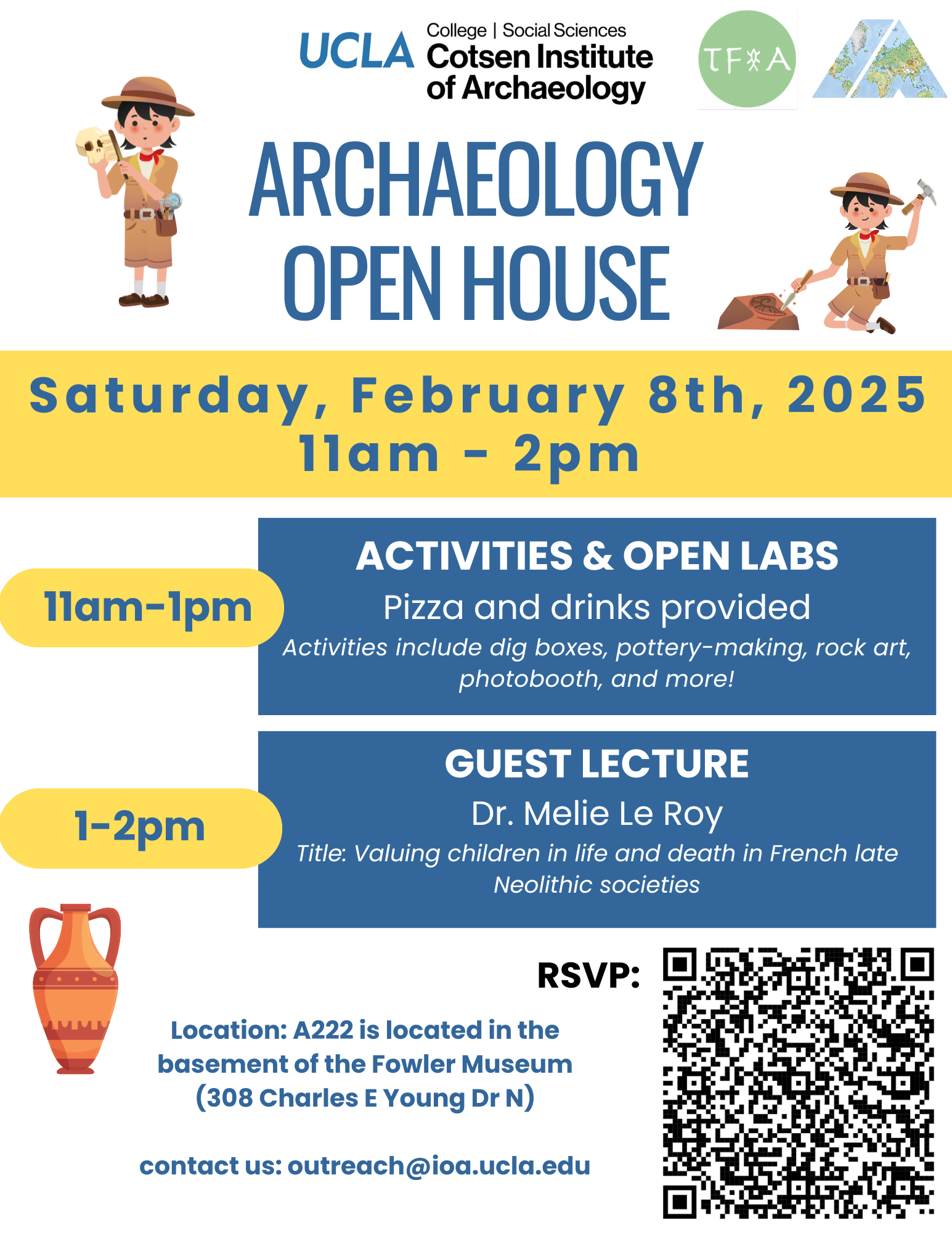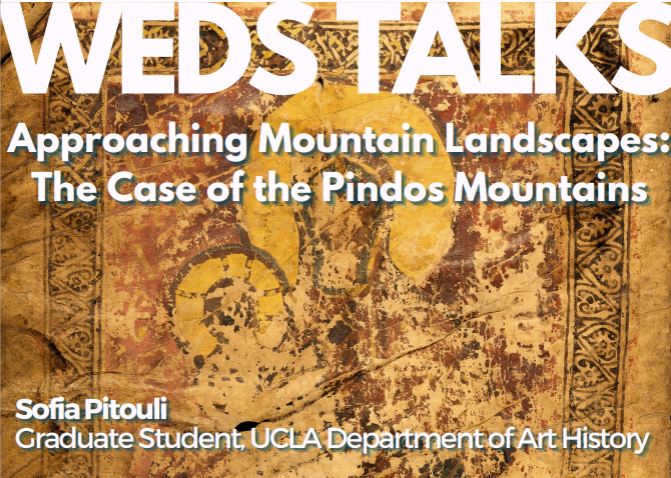Past Events
Interested in Cotsen events? Sign up for our mailing list.The Waystation Initiative and UCLA | Getty Conservation Program present a talk by Anauene Dias Soares on Brazilian Repatriation in Practice.
The illicit trafficking of cultural objects is a persistent problem in Brazil and other countries of the Global South. Insufficient legislation and public policies, coupled with failures in implementating the existing ones, hinder recovery efforts. Those involved in repatriation efforts are also often limited with legal issues of non-retroactivity and rule applicability, making little use of alternative instruments in repatriation. The cases of the Ubirajara jubatus fossil (returned from the Museum of Natural History in Karlsruhe, Germany) and the Tupinambá cloak (returned from Copenhagen, Denmark) exemplify this. Existing domestic and international laws have proved to be insufficient to prevent the misappropriation of cultural objects and to ensure their ethical management and return. A more effective solution requires global community engagement, fostering dialogue, collaboration, and the development of shared strategies to return cultural heritage to its origins.Therefore, this presentation will focus on to identify some alternative strategies, as well as ethical conditions for the repatriation of cultural objects to their place of origin, such as voluntary repatriation and its specificities. It will also present a brief comparative study of relevant legal considerations and their limitations for the return of cultural objects, both in Brazil and abroad.
This is a hybrid event. Please email waystation@ioa.ucla.edu to request a Zoom link.
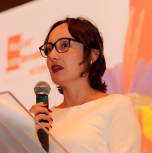 Anauene Dias Soares was the coordinator of the Brazilian Red List of the International Council of Museums (ICOM) and is an ad hoc consultant for UNESCO, where she works to combat the illicit trafficking in cultural objects. Soares is CEO/Founder of Anauene Art Law and Expertise. She is currently a Visiting Graduate Researcher at UCLA, where she is developing her PhD dissertation for the International Relations Department at the University of Brasilia (UnB).
Anauene Dias Soares was the coordinator of the Brazilian Red List of the International Council of Museums (ICOM) and is an ad hoc consultant for UNESCO, where she works to combat the illicit trafficking in cultural objects. Soares is CEO/Founder of Anauene Art Law and Expertise. She is currently a Visiting Graduate Researcher at UCLA, where she is developing her PhD dissertation for the International Relations Department at the University of Brasilia (UnB).
Contact Lyssa Stapleton
Email waystation@ioa.ucla.edu
Phone
The Dynamic Legacy of the Ifugao Rice Terraces
The Ifugao Rice Terraces, a UNESCO World Heritage site in the Philippines, represent a living cultural landscape shaped by centuries of Indigenous knowledge and community resilience. This lecture will explore the multifaceted efforts to preserve and sustain this iconic heritage amid challenges posed by climate change, modernization, and globalization. Drawing on his extensive experience with community-led initiatives, Martin will delve into strategies that center Indigenous agency in the matters of conservation and ensure that the terraces will remain both a cultural and an agricultural resource for future generations.
The lecture will revisit the origins of the rice terraces, incorporating insights from the Ifugao Archaeological Project, which redefines their history as a dynamic response to Spanish colonialism rather than an ancient legacy. By highlighting the intersections of archaeology, community education, and sustainable tourism, the presentation will showcase how the Ifugao balance cultural integrity with economic opportunities. Designed for both scholars and the larger community, the lecture will underscore the global relevance of Indigenous knowledge systems in addressing contemporary issues. It will invite a dialogue on collaborative opportunities to further engage in the preservation of the Ifugao heritage, offering pathways for partnerships that honor and amplify Indigenous voices.
Reception followed by lecture and Q&A with Marlon Martin (Save the Ifugao Terraces Movement)
Register here
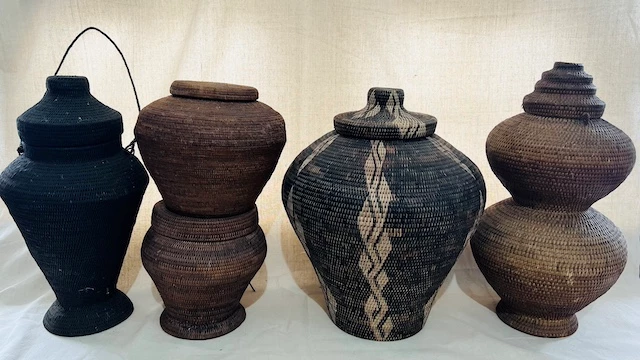
Marlon M. Martin is the executive director of the Save the Ifugao Terraces Movement (SITMo), a community-based organization dedicated to the conservation of the UNESCO-listed Ifugao Rice Terraces. A passionate advocate for Indigenous heritage and community empowerment, Martin has been instrumental in bridging local knowledge and academic research. His leadership in the Ifugao Archaeological Project has redefined how heritage research can be co-created with communities, helping to challenge long-standing misconceptions about Ifugao history. Through initiatives like the Preserving Legacies program, Martin has emphasized the centrality of community participation in developing sustainable strategies for cultural preservation and revitalization. With over two decades of experience in heritage management, Martin has contributed to national and international dialogues on Indigenous knowledge systems, climate adaptation, and the intersections of cultural and environmental sustainability. His work exemplifies the transformative potential of community-driven approaches to archaeology and heritage conservation.
Sponsored by Center for Southeast Asian Studies, Fowler Museum at UCLA, Cotsen Institute of Archaeology, Henry Luce Foundation, the Philippine Consulate General in Los Angeles, and the Office of Senator Loren Legarda (Senate of the Philippines)
Contact Center for Southeast Asia Studies
Email cseas@international.ucla.edu
Phone
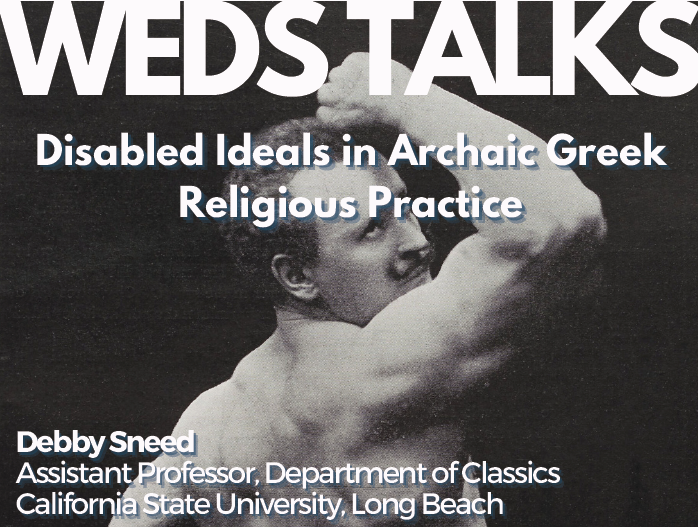
ABSTRACT: Religious practice on the Athenian Acropolis in the Archaic period is perhaps best known through the dedications that were buried on the summit after the site was sacked by the Persians in the early 5th century BCE. These dedications include marble statues of young maidens—called korai—as well as inscribed statue bases that record the names of dedicators and, sometimes, their motivations. In this paper, Debby Sneed presents the results of her co-authored study on one religious dedication and discusses what it means for our understanding of religious devotion and disability in Archaic Athens.
BIO: Debby is a UCLA alumna; she graduated with her PhD in Archaeology in 2018. Currently she is an assistant professor of Classics at California State University, Long Beach. She also serves as the Field Supervisor of the Athenian Agora excavations and summer program for the American School of Classical Studies at Athens. Her research primarily focuses on disability in ancient Greece. She has published three articles so far on the topic, including one on disability and infanticide in ancient Greece, another on ramps as accessibility features in ancient Greek healing sanctuaries, and one entitled Ancient Greek and Roman Crip Lit. She has an article forthcoming that is co-authored with Mason Shrader, a graduate student at the Joukowsky Institute for Archaeology in the Ancient World, which argues for the ethics of accessibility on archaeological excavations. In today's talk, she will present an article co-authored with Erin Lawrence-Roseman, a graduate student at Berkeley, that will be published in Art Bulletin later this year, focused on disability and ancient Greek sculpture.
Contact Sumiji Takahashi
Email sutakahashi@ioa.ucla.edu
Phone 310-825-4169
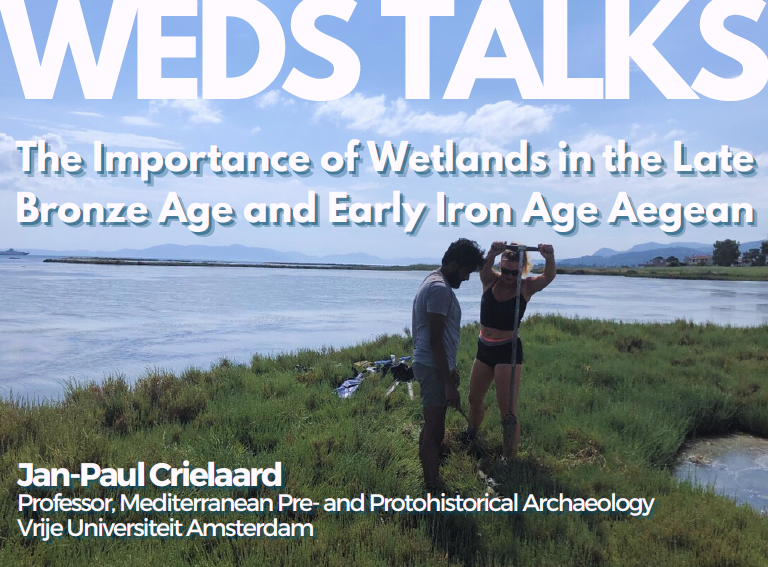
ABSTRACT: During the final stages of the Late Bronze Age, a shift in habitation towards coastal locations can be observed in several regions within the Aegean. Palaeoclimatic, sedimentological, and palynological data show that this shift includes settlement in or near marshy areas and wetlands. An assessment is made of the living conditions, as well as the advantages and disadvantages of inhabiting watery landscapes, using (bio)archaeological data and references from the Homeric epics. These findings help to shed new light on specific specimens of Late Geometric pottery, which appear to feature examples of wetland iconography.
BIO: Jan Paul Crielaard research focuses on the Early Iron Age and Archaic period, often combining written and archaeological information. He has published extensively on such topics as interconnections and culture contacts within the Mediterranean, Greek colonization, elites and elite behaviour, ethnicity, and archaeology and the Homeric epics. He has been involved in fieldwork in Greece, Cyprus, Turkey and Italy, and has been the co-director of the L’Amastuola field project in Puglia, Italy, and since 2010 directs the Plakari Archaeological Project in Karystos, and the Southern Euboia Sea and Land Routes Projects, both on the island of Euboia, Greece.
Contact Sumiji Takahashi
Email sutakahashi@ioa.ucla.edu
Phone 310-825-4169
This event has reached full capacity and is no longer accepting reservations - please email outreach@ioa.ucla.edu for information about future events.
Open House for K-12 students
Visit the labs, participate in a variety of activities including dig boxes, pottery-making, rock art, photobooth, and more!
Contact Victoria Newhall
Email outreach@ioa.ucla.edu
Phone
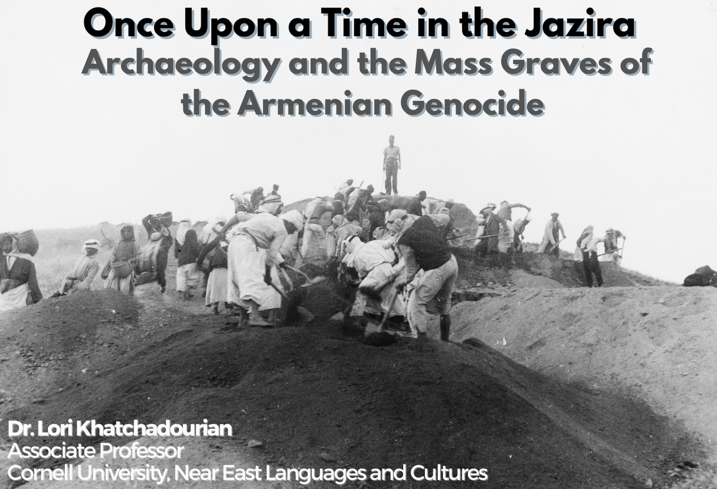
ABSTRACT: For the dead, and for the wretched who lived to give testimony to the Armenian Genocide, the Jazira region of northeastern Syria was hell on earth, its arid expanse and biblical rivers bloated with bodies and bones—the victims of Ottoman deportations and massacres. But for archaeology, which Laurent Olivier has dubbed the “consummate once-upon-a-time discipline”, the Jazira has been more akin to an Eden, brimming with vestiges of the deep past. This talk explores the practice of archaeology in this necrogeography. I disclose and diagnose how, for nearly a century, archaeology has remained virtually silent on the mass graves of the Jazira. Analysis centers on the mound of Tell Fekheriye, where several teams have uncovered and disregarded skeletal remains from the 1915-1916 massacres ever since the University of Chicago launched excavations in 1940. Among the world’s first mass grave exhumations, the Chicago project produced a collection of photographs, long buried in the archive. As archaeologists ignored the dark record of modernity in northern Syria, there emerged a parallel engagement with traces that I call survivor archaeology, a vernacular practice undertaken by genocide survivors and descendants to reckon with the memory of atrocity through the excavation, collecting, memorialization, and circulation of bones.
BIO: Trained as an archaeologist, Dr. Katchadourian's research spans the fields of archaeology, social anthropology, and critical heritage studies, with a particular focus on Armenia, the South Caucasus, and neighboring regions. Her work explore problems of empire, materiality, the archaeology of modernity, Soviet socialism and its aftermath, and the politics of heritage. Her research and teaching are temporally expansive, extending from the deep past to the present, and attentive to the ways in which the materiality of the past shapes contemporary politics, economics, and ethics. She pursue these concerns using the methods of archaeology, ethnography, spatial analysis, and archival research.
Contact Sumiji Takahashi
Phone
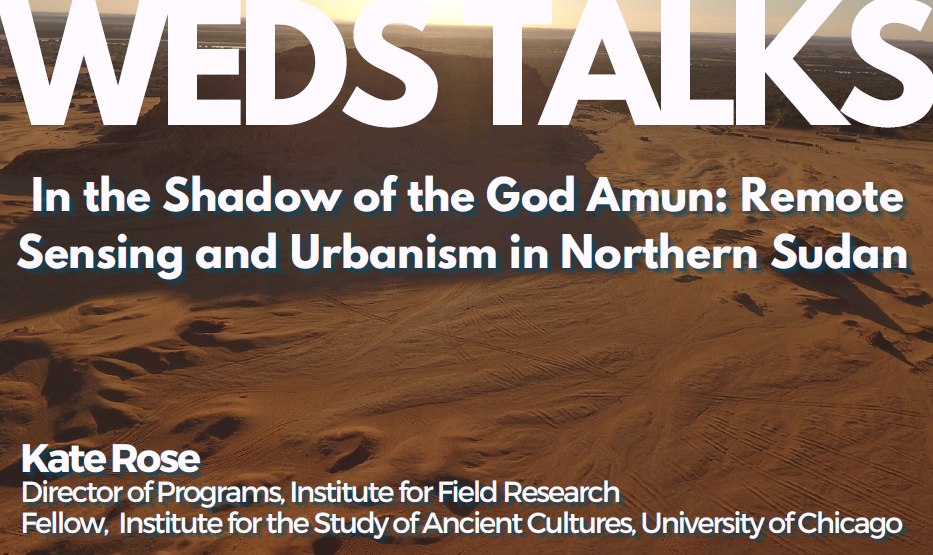
ABSTRACT: This presentation investigates urbanism and settlement patterns through multiple lines of remote sensing data in Northern Sudan. The site of Jebel Barkal, located 400 km from Khartoum, near the Nile, is known for its elite palaces, temples, and pyramids. The site served as the royal capital of Kush from the 8th century BCE and remained a major urban and religious center throughout the Meroitic Period. Recently a Meroitic settlement was identified, known as the “East Mound.” Since 2018 the Jebel Barkal Archaeological Project, in collaboration with the National Corporation for Antiquities and Museums of Sudan, has been excavating and surveying areas of the East Mound. This talk will present preliminary results of a new project aimed at analyzing LiDAR and thermal imagery data. The LiDAR and the thermal imagery extend beyond the East Mound into the modern dense and lush agricultural fields adjacent to the Nile. The data will allow us to more accurately map the settlement’s spatial extent and situate it within its broader landscape context. Objectives also include identifying any previously undocumented features such as architecture, activity areas, and paleochannels. This work contributes to our understanding of how major Kushite cities grow, evolve, and respond to environmental factors throughout their life histories. Lastly, this project ruminates on the impact of archaeological inquiry in Sudan, which is currently experiencing a civil war after years of political unrest, while centering Sudanese voices and local archaeologists.
BIO: Kate Rose is an anthropological archaeologist, specializing in landscape analysis and ancient urbanism in the Near East and North Africa. Her PhD dissertation at Harvard University is a comparative spatial analysis of Kushite royal cemeteries in Northern Sudan. As a researcher with the ERC DiverseNile Project at Ludwig-Maximilians-Universität in Munich, Germany from 2022 to 2024, she investigated landscape changes during the Bronze Age borderspace of the Attab to Ferka region. She has also held numerous lectureships and teaching positions at Harvard University and Boston University, and is interested in the intersection of pedagogy and fieldwork. She has served in various leadership positions on projects in Sudan, Egypt, Jordan, Turkey, and Spain. She is currently the Director of Programs at the Institute for Field Research, and a Fellow with the Center for Ancient Middle Eastern Landscapes at the Institute for the Study of Ancient Cultures, University of Chicago.
Contact Sumiji Takahashi
Email sutakahashi@ioa.ucla.edu
Phone 310-825-4169
The Andean Working Group presents "Beyond the Horizon: Pericentric Complexity in the Chavín Phenomenon at Atalla, Peru" by Dr. Michelle Young, Assistant Professor in the Department of Anthropology at Vanderbilt University.
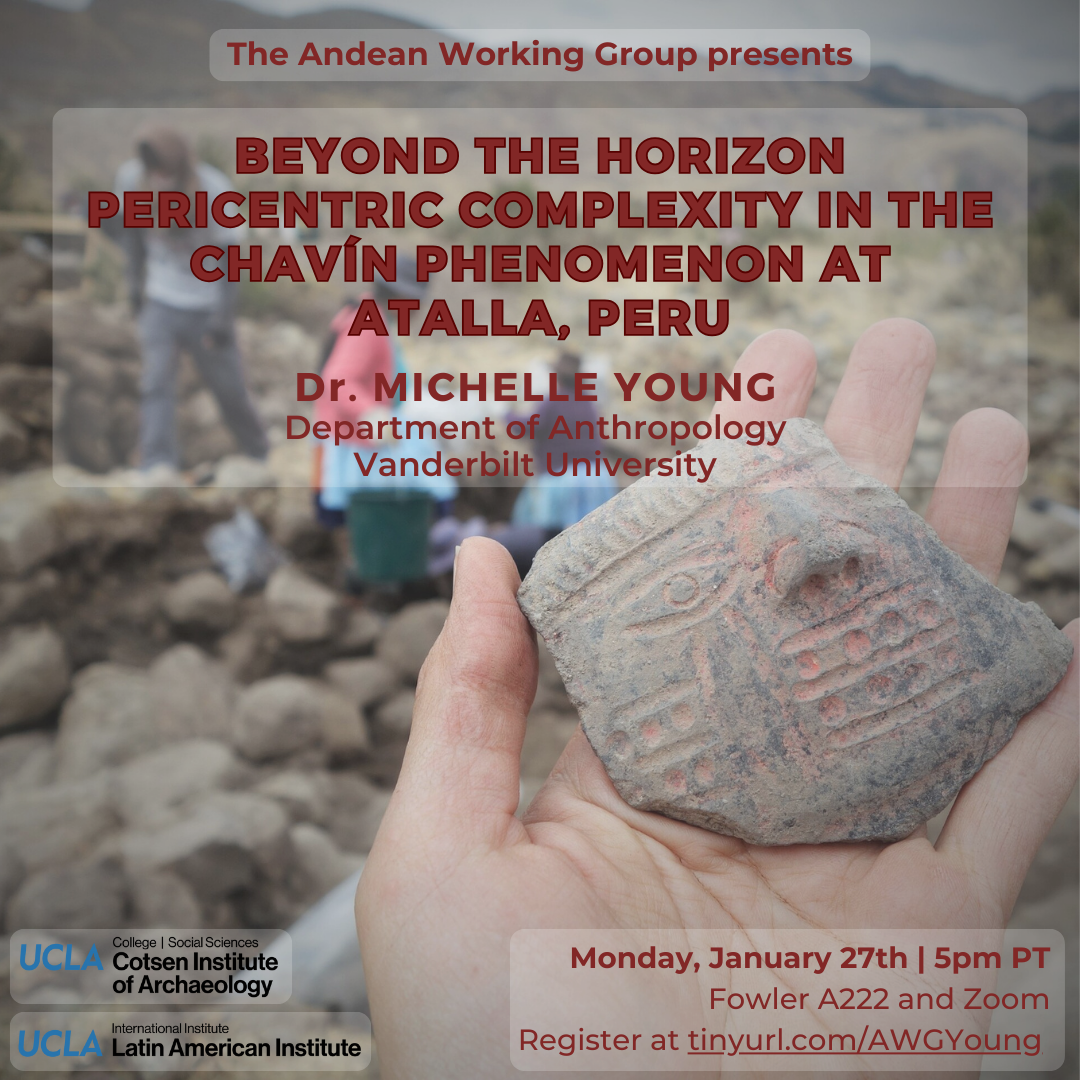
Registration is required for in-person and virtual participation.
Register at tinyurl.com/AWGYoung
This event is co-sponsored by the UCLA Latin American Institute and the Cotsen Institute of Archaeology.
Contact Gabriel Silva Collins
Email gsilvacollins@g.ucla.edu
Phone
ABSTRACT: An imperial document (chrysobull), issued in 1289 by Byzantine Emperor Andronikos II Palaiologos, confirms the privileges granted to a monastic foundation known as the Merciful Virgin in Phanari, Karditsa. The monastery was established by the sebastokratorissa Hypomone, a nun of Vlach origin who came from the transhumant nomadic group that moved between the Pindos Mountains and the Thessalian plateau. While only fragments of her monastic foundation survive today, this imperial document, read together with material evidence, offers insights into the overlapping landscapes between lowlands and uplands in the thirteenth century.
BIO: Sofia is a PhD candidate in the Department of Art History at UCLA. Her dissertation, “The Pindos Mountains: Land, Art, Community (13th-15th centuries),” explores how mountainous communities interacted with land by analyzing settlement and mobility patterns and artistic and social interactions across mountains and surrounding plains. She has received fellowships from the CMRS Center for Early Global Studies, the UCLA Stavros Niarchos Center for Hellenic Studies, Dumbarton Oaks, and the Mellon Foundation. She is the co-editor of the catalogue Weaving Dreams: Kilims from Geraki, Laconia, and has published articles on medieval soundscapes and communities.
Contact Sumiji Takahashi
Email sutakahashi@ioa.ucla.edu
Phone 310-825-4169
The statue-stelae of Early Iron Age Daunia (north Apulia, Italy), a group of stone slabs, are each incised to represent the garb and accoutrements of a person. They detail the clothing and adornment worn by men and women in full regalia, plus, through additional figurative images drawn on the robes, show ritual practices, everyday activities, and scenes of local legend. As such, they offer an unparalleled window into the lives of a proto-historic people, providing a rich source of self-representation for what is otherwise a fairly poorly understood society. Grounded in the scholarship of post-colonial and gender archaeology, this book pays full respect to the agency of indigenous communities and the important role of women. It considers the stelae not through a Hellenic lens, but in the Italo-Adriatic context to which they belong. This is the first time an in-depth, holistic study of the Daunian stelae has been undertaken, and the first presentation of the material in English.
6pm Lecture
7pm Reception
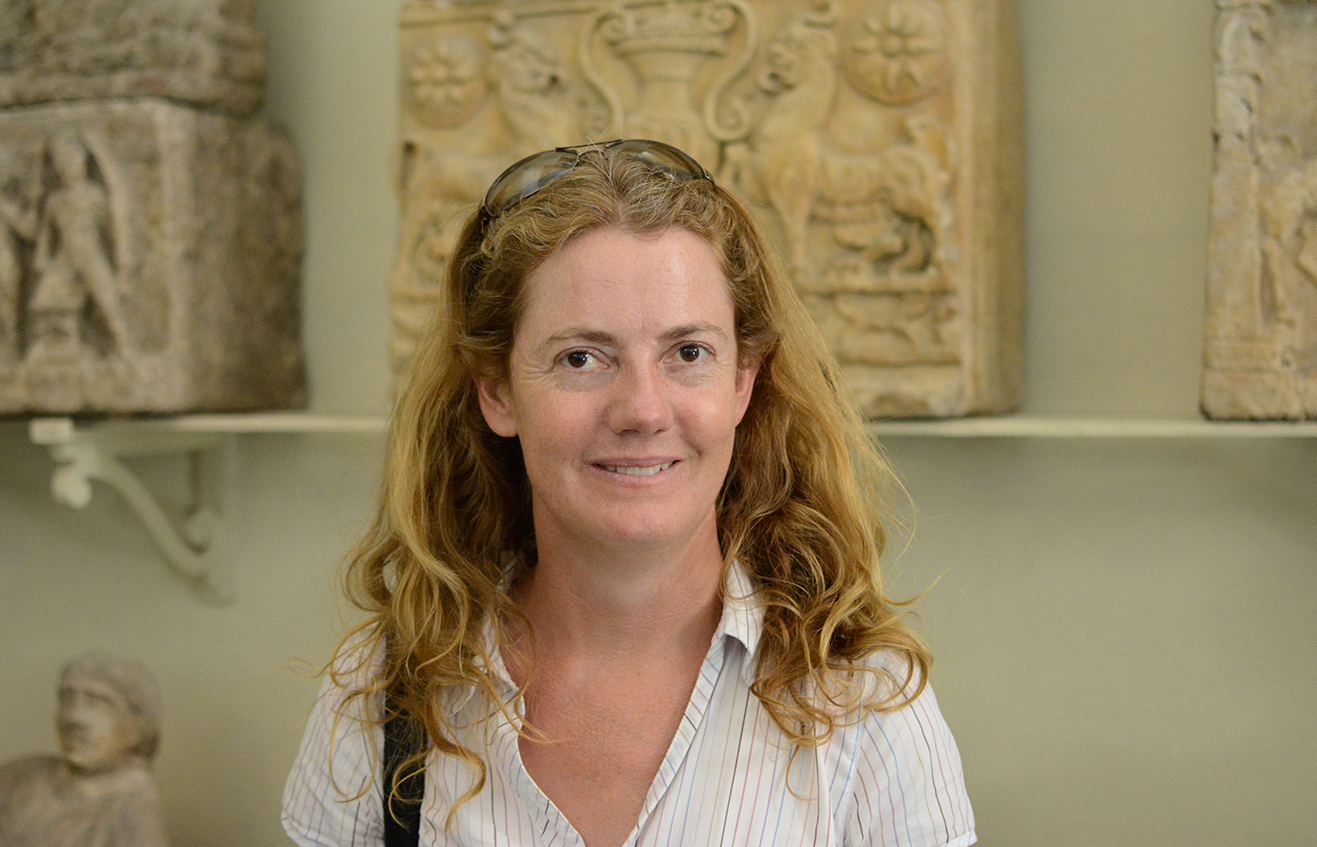
Camilla Norman is an archaeologist based at the University of Sydney whose particular interest is the Early Iron Age central Mediterranean. She was for many years the Project Officer of the Australian Archaeological Institute at Athens and has held post-doctoral positions in Italy (The British School in Rome) and England (The Institute of Cultural Studies, London University). She has worked on sites throughout central and southern Italy, mainland Greece, Jordon and Australia, as an excavator, illustrator and finds specialist.
Contact Michelle Jacobson
Email mjacobson@ioa.ucla.edu
Phone
- ‹ previous
- 4 of 50
- next ›



